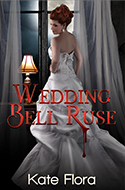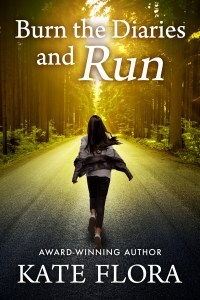Writing too Dull? Pry those Chapters Apart and Insert . . .
Kate Flora: I am having one of those restless days. You know the ones. Scarred, the  manuscript that needed the editor’s comments reviewed has been reviewed and revised. The book that the publisher is reverting back to me, Wedding Bell Ruse, has been reviewed and I’m readying the steps to republish it. The next Joe Burgess, Deliver Us from Evil, has gone through a first edit and is ready for review by beta readers. My back is killing me, a random thing that strikes from time to time, usually when I have some heavy lifting I need to do and cannot.
manuscript that needed the editor’s comments reviewed has been reviewed and revised. The book that the publisher is reverting back to me, Wedding Bell Ruse, has been reviewed and I’m readying the steps to republish it. The next Joe Burgess, Deliver Us from Evil, has gone through a first edit and is ready for review by beta readers. My back is killing me, a random thing that strikes from time to time, usually when I have some heavy lifting I need to do and cannot.
And so, looking for ideas for today’s blog post, I’ve been digging around in my old teaching files, looking for something useful to share. I have drawers full of files that go back years and years. The process makes me feel old. What did I teach back in 1999? In 2007? In 2011? Hear the big sigh?
 One thing I have learned from writing about thirty books and publishing for thirty years is that often I tend to rush my stories. I’m worst at the end, of course, when I’m eager to be done and to move on to the next story that’s trying to occupy my mind. Often, too, though, when I reread I find that I’ve left out essential scenes that are necessary for the plot, and I have to pry my chapters apart and insert a new one with the necessary information.
One thing I have learned from writing about thirty books and publishing for thirty years is that often I tend to rush my stories. I’m worst at the end, of course, when I’m eager to be done and to move on to the next story that’s trying to occupy my mind. Often, too, though, when I reread I find that I’ve left out essential scenes that are necessary for the plot, and I have to pry my chapters apart and insert a new one with the necessary information.
Sometimes, something different happens. Sometimes I’ll be writing along and I get absolutely stuck. Take a walk. Make a cup of tea. Go on ebay and buy some shoes. All of these things work. Even doing the laundry can sometimes bring the necessary clarity. But sometimes the thing just won’t write. It won’t stop being dull or my characters are just talking and nothing is happening. I know that if I am bored, you will be, too. That’s when I turn to some advice I heard in a workshop by Elizabeth Lyon to Sisters in Crime years ago.
Her very useful book is called Manuscript Makeover: Revision Techniques No Fiction Writer Can Afford to Ignore.One of the things she taught us in her workshop was about something she called “Riff Writing.” She offers this description:
We’ve all seen and heard a riff, in person or on TV. Whenever a musician, often playing jazz or rock, departs from the practiced notes of the band or sheet music and takes off on a spontaneous solo, he or she is playing a riff. Applied to our art, I call this “riff writing.”
It is similar to what has been called free writing or writing to a prompt—a picture or word or memory—or free association on paper. These methods fill your pages with writing, they help loosen you up and stick it to the censors, and they generate ideas for manuscripts. Riff-writing differs from these methods by being expressly applied to revision a portion of your writing. In this way, it’s not free writing; it’s very directed. You already have your art, your novel or short story. Riff-writing helps you expand your imagination around a particular problem or need—to lengthen a section, to add images, or to develop more characterization. You can then take the riffs and fold them into your story.
Here are the steps:
Select a sentence or paragraph in your story that seems tight, brief, or could use more behind it.
Choose a jumping-off place, such as a character’s feeling, an object, a memory, an attitude, the setting, or any other element of craft or part of speech that arrests your attention and needs revising.
Start you riff-writing, opening up at that jumping off point and developing it. Follow it like a winding creek and allow yourself to express whatever great, good, nonsensical, lewd, or dumb phrases come to mind. You have no limits or boundaries. Over-write. Don’t stop when you have the first impulse to. Keep writing; keep writing.Later, when you edit and revise, after the riff-writing has had a chance to “cool off,” you’ll have more distance from which to delete what doesn’t fit for your story, and you may have even more ideas for refining the old material.This advice works for already written material. I would also say that, with NANOWRIMO coming up in November, everything that you’ll be doing can profit from this advice. Turn off those critical editing heads that perch on your shoulder and keep saying no. Just say yes and see where the writing takes you.
And on a completely different note: Are you signed up for the New England Crime Bake, our region’s own mystery conference that takes place in Dedham, MA on Nov.10-12? If you’re a writer, a mystery fan, or someone who dreams of writing your mystery novel, you should be there. More at crimebake.org
Lea Wait's Blog
- Lea Wait's profile
- 509 followers



